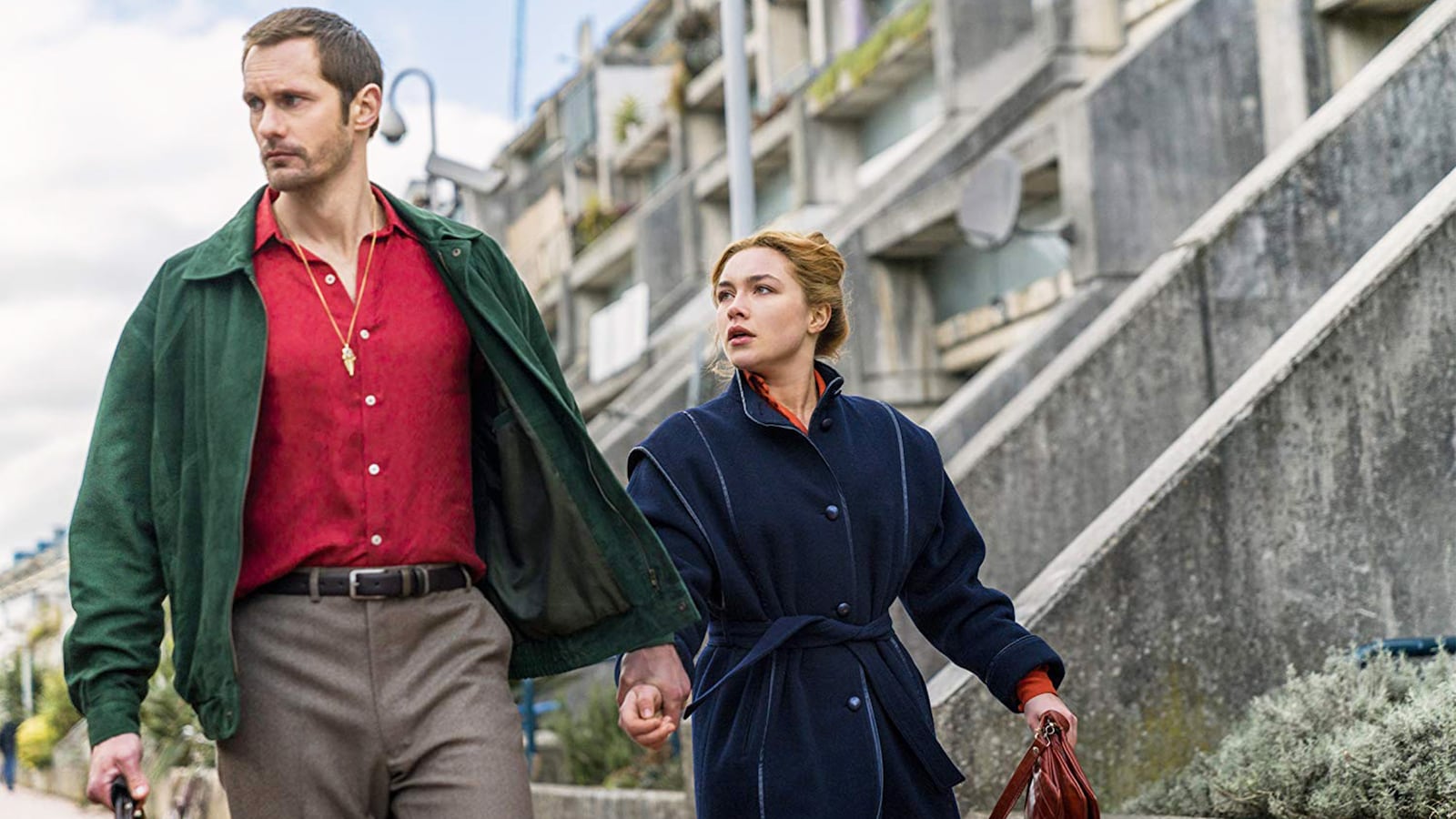What do you get when you take Park Chan-wook, the inventive Korean mind behind the unrelenting Oldboy and prized lesbian romance The Handmaiden, and pair him up with a groovy, late ’70s John le Carré espionage plot?
The answer lies in The Little Drummer Girl, a new miniseries that’s less interested in competing intelligence schemes than in the seductive power of playing pretend. Premiering in three parts on AMC starting Nov. 19, the six-part series brims with style and intrigue—and ranks among the best espionage TV dramas in recent memory.
Florence Pugh acts as the series’ glue in the complex role of Charlie Ross, a spunky young thespian prone to flirtation with things that intrigue her—difficult acting roles, mysterious men, radical lefty politics. When we meet Charlie, she’s the star of an experimental theater production in Britain in which she plays the principal, Joan of Arc. But soon enough, Charlie will be recruited to serve as a different kind of martyr—a seductress coached by the Zionists to infiltrate a community of Palestinian insurgents.
The Israeli contingent is overseen by Kurtz (Michael Shannon), whose command over his intelligence team becomes akin to a kind of theater direction. Among the top spies under his supervision, Gadi (Alexander Skarsgard) is the most dexterous and, not for nothing, the most handsome—a chivalrous avatar of inscrutability. So when Kurtz identifies Charlie as a desirable recruit, it’s Gadi who travels to Greece, where Charlie’s vacationing with her troupe, to seduce and reel her in.
Meanwhile, a series of bombings targeting prominent Zionists has caused a state of emergency for Kurtz’s team. They’ve managed to trace the attacks to a particular Palestinian family who presides over a web of angry anti-Zionist soldiers. Charlie, young and passionate, is to pose as the girlfriend of one of the terrorist brothers named Michel (Amir Khoury), a man she’s hardly laid eyes on. To aid in the plan’s realism, Gadi will spend time with Charlie and serve as a stand-in for Michel, playing the part of her lover so that, when Charlie is interrogated by Michel’s allies later on, she will have a trove of (sort of) real memories on reserve to prove that the relationship actually happened.
Though the setup sounds confusing, the narrative alone—the machinations of both the Israeli and Palestinian sides—is easy to follow. What’s truly complex is the theme of performance that pervades the plot: the ever-churning question of what’s real and what’s pretend. Park imbues each scene with this uncertainty—playing out Charlie’s invented memories as if they were real, interchanging Gadi with Michel halfway through a scene, repeating Michel’s rhetoric in Gadi’s voice. In one climactic moment when Charlie is being quizzed by suspicious Palestinians inside a trailer, all of the lights in the room go out and, like actors on a malfunctioning stage, the interrogators are forced to halt the inquiry to fiddle with the fusebox.
Pugh, who burst out in 2016 with her turn as a brazen wife detained by a cruel husband in Lady Macbeth, is a fascinating screen presence, taking a role that could’ve been played as naive—the childishly cheeky ingenue—and injecting it with cool confidence and moxie. Charlie’s taste in men, as she informs Gadi early on, is “deeply dodgy”—a qualifier that could be similarly used to define her taste for reckless adventure. When in later episodes Charlie, working her way into the Palestinian network, is tossed into a brutal military training camp in Lebanon, her fiery energy is fully unleashed: during a wrestling match, she bites into the calf of a man three times her size.
While we get a deep, stylized sense of characters’ passion—sexual passion between lovers; violent passion between enemies—Park keeps the story’s politics at a distance. The narrative may be built around the Israeli-Palestinian conflict, but the series is careful about not taking sides, a tactful choice for a world in which hostility and violence between the groups continues to broil every day. Instead, the series manifests its morality through questions surrounding individual death. Do murderers deserve to die without trial? Do their families? Does saving many lives justify the sacrifice of several?
In one early scene, perched on a hill by the Acropolis at night, Gadi and Charlie bend and contort to cast giant shadows on a stone wall. At this point, Charlie doesn’t yet know what sort of spy scheme she’s in for—the real-life world of shadowy figures and illusions, people with whom she must conceal all but a silhouette of her former self. While in The Handmaiden Park crafted a world of luscious texture and design, sets in The Little Drummer Girl are less lush than groovily garish, shimmering with surreality.
It’s a fitting aesthetic for a story that, in every scene, requires at least one person on screen to be engaging in some sort of deception. “This is your debut in the theater of the real,” Gutz tells Charlie once she’s signed on to perform under his direction. She puts on a dazzling show.





